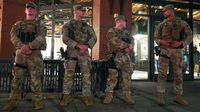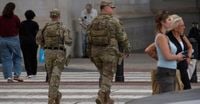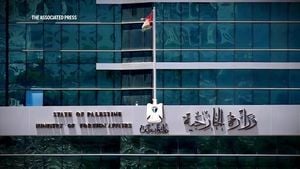On the evening of August 24, 2025, the streets of Washington, DC, took on a distinctly different tone. National Guard troops, deployed from six states at the direction of President Donald Trump, began openly carrying service-issued firearms—a striking escalation in the federal government’s ongoing campaign to address crime in the nation’s capital. According to the Joint Task Force-DC, the nearly 2,300 National Guard members now patrolling the city’s neighborhoods are authorized to carry M17 pistols or M4 rifles for personal protection, a move made possible by a directive from Defense Secretary Pete Hegseth late last week.
“Starting the late evening of August 24, 2025, [Joint Task Force-DC] service members began carrying their service-issued weapon,” the task force announced in a statement, as reported by Reuters. The rules of engagement are strict: force is to be used only “as a last resort and solely in response to an imminent threat of death or serious bodily harm.”
The Pentagon’s shift in posture was visible on the ground. A CNN reporter witnessed two Guard members carrying long guns in The Wharf, a bustling waterfront neighborhood, while an Associated Press photographer spotted members of the South Carolina National Guard outside Union Station with holstered handguns. In Chinatown, several armed Guard troops wore patches labeled "MP," signifying their role as military police. Not all troops are armed; those assigned to community restoration or beautification tasks remain unarmed, the task force told NBC News.
The deployment is part of President Trump’s broader anti-crime agenda, which has included a federal takeover of the DC police department and an increased presence of federal law enforcement. Trump has repeatedly claimed—without evidence—that DC is experiencing a crime wave, even going so far as to boast on Truth Social that there is “NO CRIME AND NO MURDER IN DC!” The data, however, tells a different story. According to DC police, violent crime had dropped roughly 27% year over year at the time the troops arrived, and overall crime numbers in 2025 are lower than in 2024.
Despite the president’s rhetoric, the city’s experience with crime is nuanced. During the week beginning August 12, the first full day the Trump administration controlled the Metropolitan Police Department, government data analyzed by CNN showed a moderate drop in reported crime—but also a sharp rise in arrests of immigrants. The deployment has drawn both support and sharp criticism, with protests erupting across the city and residents expressing confusion and fear over the heavy military presence.
To bolster the DC National Guard, more than 1,900 troops from West Virginia, South Carolina, Mississippi, Ohio, Louisiana, and Tennessee—mostly GOP-led states—were called in. Nearly 60% of the Guard members currently in DC are from out of state, with West Virginia Governor Patrick Morrisey sending more than 400 troops “as a show of commitment” to Trump’s initiative, according to NBC News.
Trump’s willingness to deploy troops to Democratic-led cities has not stopped at DC. On Sunday, he threatened to “send in the ‘troops’” to Baltimore, labeling it “out of control” and “crime-ridden.” This came in response to an invitation from Maryland Governor Wes Moore, who challenged the president to visit Baltimore and see its progress firsthand. Trump declined, stating, “I would much prefer that he clean up this Crime disaster before I go there for a ‘walk’.”
Official statistics from Baltimore tell a story at odds with the president’s narrative. The city has recorded 84 homicides so far in 2025—the fewest in more than 50 years, according to Mayor Brandon Scott. In fact, Baltimore’s violent crime rate has fallen sharply in recent years: 200 homicides were reported in 2024, down 24% from the year before and 42% since 2021. “The president is spending all of his time talking about me,” Moore said on CBS’s “Face the Nation.” “I’m spending my time talking about the people I serve.” Moore accused Trump of “spouting off a bunch of lies about public safety in Maryland.”
Trump’s comments have extended to other major cities. He has named Chicago and New York as likely next targets for National Guard deployments, prompting strong pushback from Democratic leaders. Illinois Governor JB Pritzker rejected the idea outright, saying, “Donald Trump is attempting to manufacture a crisis, politicize Americans who serve in uniform, and continue abusing his power to distract from the pain he’s causing families.” Chicago Mayor Brandon Johnson went further, vowing to sue if federal troops are sent: “We’re not going to surrender our humanity to this tyrant. The city of Chicago has a long history of standing up against tyranny, resisting those who wish to undermine the interests of working people.”
The presence of thousands of National Guard and federal law enforcement officers in Washington, DC—a city of just over 700,000 people—has been met with sporadic protests and mounting concerns about civil liberties. Videos of arrests and detainments have circulated widely on social media, fueling debate about the motivations behind the deployment. The Rev. Al Sharpton, speaking at Howard University, argued that the operation was “about profiling us,” and described it as “laced with bigotry and racism.” He added, “Not one white mayor has been designated. And I think this is a civil rights issue, a race issue, and an issue of DC statehood.”
For many Washingtonians, the federal takeover is a reminder of the city’s unique status. Since DC is not a state, the president has the authority to take over policing for up to 30 days—a power Trump has now exercised. Efforts to grant DC statehood have stalled; although a bill passed the Democrat-controlled House in 2020, it was not pursued further. The National Guard, typically a reserve force called upon for emergencies or overseas missions, now finds itself at the center of a contentious political and social debate.
As the new school year begins, the federal task force is staffing a request by local police for increased Guardsmen presence at metro locations, aiming to provide a safe environment for students and commuters. Despite the visible show of force, the White House told NBC News that National Guard troops are not making arrests and continue to focus on protecting federal assets and supporting law enforcement officers.
The deployment marks a rare and highly charged use of military power in the heart of American democracy. Whether it will have a lasting impact on crime—or on the political fortunes of those involved—remains to be seen. For now, the city’s residents are left to navigate a landscape transformed by uniforms, sidearms, and the ever-present weight of federal authority.





